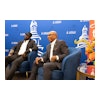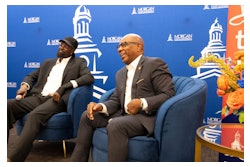WASHINGTON, D.C. – With political landscapes around the world constantly in flux, institutional leaders must focus on how to bring stability and prosperity to their societies, a U.S. state department official said Thursday at a global conference on higher education.
“As nations throughout the world go through political transformation, as the world economy becomes much more global and interconnected, as international society is presented with challenges, whether they be political or environmental, that shapes the way we look at education,” said Adam Ereli, Principal Deputy Assistant Secretary for Educational and Cultural Affairs at the U.S. Department of State.
“By that I mean what is the impact on education in these phenomena? What decisions do we have to make? … What resources do we need to reallocate to ensure that education is serving the broad purpose of a more stable and prosperous world?”
Ereli made his remarks Thursday at the 2012 International Education Summit on the Occasion of the G8, hosted by the Institute of International Education, or IIE. The theme of the conference was “International Education: A Global Economic Engine.”
The conference drew dozens of higher education leaders from countries as diverse as Qatar and Canada, Malaysia and Australia.
Key questions raised at the conference included how to ensure quality and access as nations and institutions of higher learning seek to collaborate in their respective efforts to prepare more “globally competent” students.
Several speakers stressed the need to make international education about more than just spending a semester studying abroad.
“We also believe we should shift the focus of our postsecondary grant programs from the acquisition of deep subject matter expertise for a small number of students, to a greater emphasis on the acquisition of broad global competencies for many students to gain,” said Dr. Martha Kanter, Under Secretary of Education at the U.S. Department of Education.
Kanter shared the Obama administration’s college completion agenda, which calls for increasing the proportion of the nation’s post-secondary graduates from 40 to 60 percent by the year 2020.
But Kanter shied away from framing the goal as a matter of restoring the United States to its former number one position in world in college degree attainment – as the issue is often framed in U.S. policy discussions.
Asked why she didn’t emphasize the Obama administration’s desire to make the U.S. the most college-educated nation in the world, Kanter didn’t backtrack from the goal, but said rather that she wouldn’t mind if there were numerous nations all competing for the top spot.
Ereli said institutional leaders must pay particular attention to the aspirations of their populations in order to make their societies more stable.
“The fact of the matter is the world is getting younger,” Ereli said. “The (youth) bulge is getting bigger and the expectations of young people are not those of what their parents were.
“The world is wide open,” Ereli said. “People everywhere around the world see what people elsewhere are doing and they want to be part of it.
“If government doesn’t satisfy those aspirations you will have problems. You’re going to have a lot of people without anything to do, frustrated, angry,” Ereli said. “That’s a recipe for trouble.”
The key to stability and economic growth is providing education and training that leads to employment, Ereli said.
Ereli said institutions of higher education need to be “more global, more focused on transmitting skills and knowledge that can be used to foster economic opportunity and inclusion.”
“And they cannot be, and here I think I might be stepping on some toes, it cannot be statist, i.e., the model of public policy where everything flows from the state doesn’t work anymore.
“Why? Because the demands are too great,” Ereli said. “There are too many people wanting to move too fast for any governmental entity to satisfy all of those demands by itself.”
Despite the conference’s emphasis on global collaboration and international cooperation, Ereli said English is the “lingua franca” of higher education.
That drew criticism from some conference attendees, who said while they acknowledged that English is the language of trade and travel, there should be a greater emphasis on cross-cultural understanding, and that foreign language study was one of the best ways to achieve that end.
Dr. Beverly Tatum, president of Spelman College and a board member at IIE who attended the conference as part of the U.S. delegation, was among those who sought more clarity about the role that language should play in international education.
She said international education is a critical part of assuring that future generations of students are “ready to engage across lines in ways that are cooperative and collaborative and lead to shared problem-solving.”
After a meeting on the economic impact of international education, Tatum said the value of study abroad experiences can’t always be quantified in terms of dollars and cents.
“We can’t always monetize what the impact is,” Tatum said of international education. “But it’s essential from a diplomatic point of view.”


















